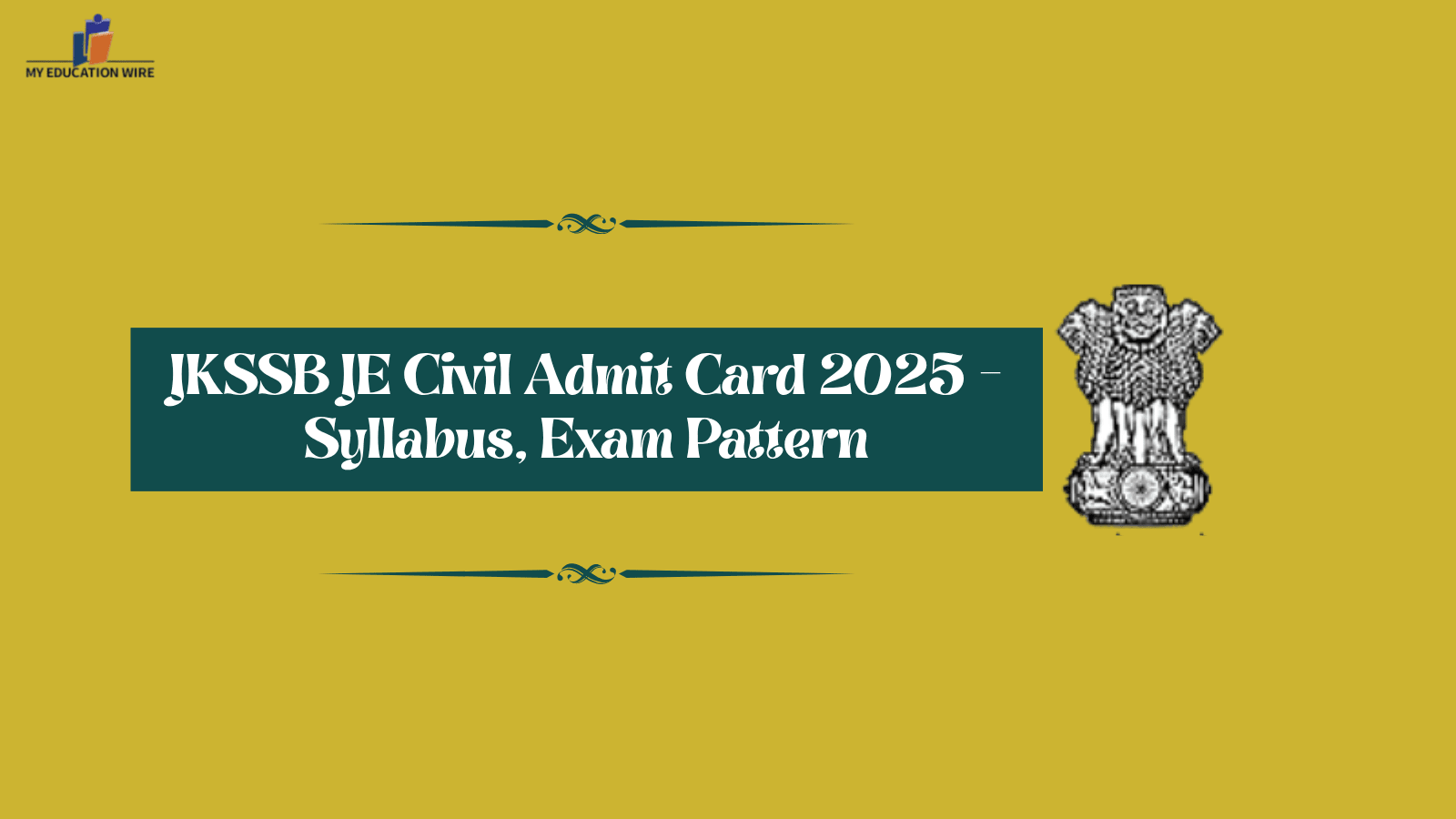
The JKSSB Junior Engineer (JE) Civil Exam 2025 New Exam Dates Out. The Exam will be held on November 02, 2025, and admit card will be out on October 27, 2025
Previous Exam Date – 31 August 2025
for the recruitment of 508 Junior Engineer (Civil) posts under the Public Works Department (R & B) and the Jal Shakti Department. The Jammu and Kashmir Services Selection Board (JKSSB) has designed a detailed syllabus to test candidates on their technical knowledge, reasoning ability, and engineering concepts. To score well, Candidates should focus on understanding core civil engineering topics and practicing previous year papers to increase their accuracy.

Advt. No. – 3/2025
JKSSB JE Civil Syllabus 2025 – Topic-Wise Question Distribution
The JKSSB Junior Engineer (JE) Civil Exam 2025 syllabus covers all the main topics of civil engineering to test the practical and technical skills of candidates. There will be 10 questions from Surveying to check basic measurement and mapping knowledge. Mechanics and Structural Analysis will have 15 questions to test understanding of forces and structures, while RCC Structures will also have 15 questions focusing on reinforced concrete design.
More Topics You can check in the table below:Surveying 10 Mechanics and Structural Analysis 15 RCC Structures 15 Soil Mechanics 10 Fluid Mechanics and Hydraulics 15 Irrigation Engineering 10 Water Supply and Wastewater Engineering 10 Highway Engineering 10 Railway Engineering 10 Construction Planning Management 15
Detailed Breakdown of JKSSB JE Civil Syllabus 2025
Surveying
Importance of surveying, principles and classifications, measurements of distance and directions, chain surveying, compass surveying, leveling, tachometry, the odolite, traversing, contouring, plane table surveying, curves.
Mechanics and Structural Analysis
Introduction, concept of rigid body, scalar and vector quantities, laws of force, moment, friction, centre of gravity, simple machines, torsion, properties of material, bending moment and shear force in statically determinate beams, simple stress and strain relationship, stress and strain in two dimensions, principal stresses, stress transformation, simple bending theory, flexural and shear stresses, unsymmetrical bending, shear centre, thin-walled pressure vessels, uniform torsion, buckling of column, combined and direct bending stresses, slope and deflection, analysis of trusses.
RCC Structures
Concrete technology, ingredients of concrete, water cement ratio, workability properties of concrete, admixtures, special concretes, nondestructive tests, basics of mix design, concrete design (basic working stress and limit state design concepts), analysis of ultimate load capacity and design of members subjected to flexure, shear, compression, and torsion by limit state methods, basic elements of pre-stressed concrete, analysis of beam sections at transfer and service loads, one-way slab, two-way slab.
Soil Mechanics
Origin of soils, properties, soil classification, three phase system, fundamental definitions, relationship and interrelationship, flow of water through soils, permeability & seepage, effective stress principle, deformation of soils, consolidation, compaction, shear strength characteristics, plate load test, SPT, density control, measurement of field density by core cutter and sand replacement method, soil exploration, bearing capacity and its methods.
Fluid Mechanics and Hydraulics
Properties of fluids, hydrostatic pressure, measurement of pressure, flow measurements, flow through pipes, flow through open channels, hydraulic pumps, principle of conservation of mass, momentum, energy and corresponding equations, potential flow, applications of momentum and Bernoulli’s equation, laminar and turbulent flow, flow in pipes, pipe networks, concept of boundary layer and its growth, uniform flow, critical flow and gradually varied flow in channels, specific energy concept, hydraulic jump, forces on immersed bodies, flow measurements in channels, tanks and pipes, dimensional analysis and hydraulic modeling, kinematics of flow.
Topics To Cover Along With Details:
| S.No. | Topic | Details |
| 1 | Irrigation Engineering | Introduction, water requirement of crops, hydrological cycle, dams, canals, dam head works and regulatory works, cross drainage works, hydraulic structures, river training works, water-logging, drainage, groundwater recharge, well hydraulics. |
| 2 | Water Supply and Waste Water Engineering | Introduction, quantity of water, quality of water, water treatment, conveyance of water, laying out of pipes, building water supply, water supply fixtures and installation, plumbing, sewerage system, laying and construction of sewers, sewage characteristics, methods of disposal, sewage treatment, building drainage, air and noise pollution. |
| 3 | Highway Engineering | History of development of highway and planning, definitions of various terms used in highway engineering, methods of road construction, IRC classification, highway surveys and plans, geometric design, different types of road materials in use, binders, types of pavement, CBR method, subgrade preparation, WBM, WMM, bituminous macadam, dense bituminous macadam, special problems in hill road. |
| 4 | Railway Engineering | History of Indian railways, gauges used, permanent way and its components, types of rails, creep, welding, rail fixtures and fastenings, signaling, points and crossings, bridge terminology, classification, components, foundations. |
| 5 | Construction Planning Management | Network diagrams, PERT-CPM, cost optimization, contracts, tenders, depreciation, valuation, organization, measurement books, cash book, functions of management, construction planning, quality control, inventory control, estimation and costing definitions, methods of estimation and types of estimates. |
JKSSB JE (Civil) 2025 Admit Card
The Admit Card for the exam JKSSB JE (Civil) Exam 2025 will release on October 27, 2025. The Exam will conduct on November 11, 2025. The admit card is important document to carry at the examination center. without admit card you are not eligible to enter into examinaiton hall. To download JKSSB JE Civil 2025 Admit Card Must follow steps available below.
How To Download JKSSB JE (Civil) 2025 Admit Card
To download the JKSSB JE Civil exam admit card 2025 check steps:
Step-1: Open your search engine and visit on the official website of JKSSB.
Step-2: At home page you will found – “what new section” click on it.
Step-3: Now Looking for the JKSSB JE (Civil) Admit Card 2025 and click on the Admit Card link.
Step-4: Fill all required information and click on the submit button.
Step-5: Now admit card will available on your screen. download the admit card to carry at the examination center.



